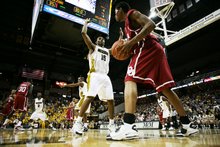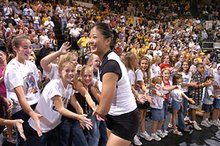(Now that I'm done with the '93-'94 Redux series, I'll be posting Mizzou links each morning in their place.
Oh, and screw Florida.)
March 27, 1994
LOS ANGELES -- A basketball season that will go down as one of the most stirring, unlikely and perhaps the best in the 88-year history of the University of Missouri program finally played out yesterday, one game shy of college basketball utopia -- the Final Four.March 29, 1994
Top-seeded Missouri, which lost 92-72 to second-seeded Arizona in the NCAA Tourament West Region final, matched the program's deepest postseason run, first accomplished in 1976. The '94 team won a school-record three tournament games, one more than the '76 team and probably three more than many prognosticators envisioned five months ago.
Unranked and picked to finish third in the Big Eight Conference before the season, the Tigers mounted an improbable 14-0 charge through the rugged Big Eight and peaked at No. 3 in The Associated Press rankings. Only two other teams had ever navigated the league without losing. Missouri finished with a 28-4 record, which was one victory shy of the school record.
Despite the records and the accompanying glory, players and coaches found it difficult to reflect on the season after coming within a game of the Final Four.
“It hurt to get so close. God, it hurts,” said senior guard Melvin Booker, who emerged this season as the Big Eight Player of the Year.
A segment of the 600 or so Missouri fans shared the players' pain by crying. Some fans just lingered in the stands, staring silently into a half-empty Los Angeles Sports Arena. Others recounted how much they enjoyed following the team from Columbia to Kansas City for the Big Eight Tournament, then to Ogden, Utah last week for the NCAA first round and finally to L.A.
The four-game tournament stay did more than just provide fans a couple of weekend road trips. It metamorphosed MU's national exposure, which among other contributions could aid recruiting, and gave the players lifetime memories.
Then there were the ripple effects, such as the reunion of old friends Jak and Marsha Campbell of Kansas City who hooked up with classmate Melinda Beach and her husband Dan of Los Angeles. The Campbells and Melinda Beach graduated from MU in the late 1960s.
“I feel bad because it's the first game I've been to” in a long time, “and I kind of feel responsible,” said Dan Beach, who did not attend MU but is a converted Tiger fan.
He was joking, of course, and Marsha Campbell was trying find a silver lining in the loss.
“We didn't want to go to Charlotte anyway because it's too hard to get airline reservations,” she said of the Final Four city.
For Dean and Sara Grimm, the extended season only reaffirmed the good feeling they said they had when their son Derek chose Missouri last year. He played five minutes yesterday but is considered a future starter.
“It's been a wonderful opportunity for Derek, and it's been a wonderful opportunity for the family,” Sara Grimm said. “It's nice to be sure he could make the right choice for a school. And he made the right choice.”
They're the kind of words that plunge a dagger into the heart of the argument by some faculty members that big-time athletics have no place at a university.March 30, 1994
Missouri basketball coach Norm Stewart was holding court Friday with 15 or 20 sportswriters, fielding questions about his team's upcoming NCAA Tournament game against Arizona. Somehow the subject drifted into the ripple effect of benefits that a successful athletic program can produce. National exposure for the university rated high among them.
“To me, that's what an athletic department and that's what a basketball program do for a university,” Stewart said. “You give them the exposure that they can't get through other means.”
Exposure. There are two ways to get it: Pay for it or attract it.
Because money is not an endless resource, free promotion is valuable. And very few events attract more attention than the NCAA Tournament. That's why CBS is paying $1 billion over seven years to televise March Madness instead of chemistry experiments or anthropology lectures.
A spokesman for CBS in New York today said ratings showed that about 8.9 million households watched the MU-Syracuse game on Thursday. Though figures for Saturday's game against Arizona were not available, they were expected to be higher.
Those figures cover just the actual game broadcasts. They don't account for the coverage leading up to and following the event through newspapers, magazines, radio stations and local TV affiliates.
Southern Cal sports information director Tim Tessalone, who coordinated media services for the West Region games, said he issued more than 350 media credentials for the event. The media crush included newspaper reporters from Washington, Philadelphia, New York, Dallas, Houston, San Francisco, Phoenix and Portland, Ore., among other places, and representatives of CBS, ESPN and CNN.
Measuring the effects the publicity might bring is more difficult.
“I think the intangible factor is hard to assess,” MU athletic director Joe Castiglione said. “Yet, it seems to be the one area you can't overlook.
“When you look at all the people this event will touch ... maybe we're making some new fans.”
When Colorado won college football's mythical national championship for the 1990 season, it coincided with a year in which one of its professors had won a Nobel Prize. In the next year, the school -- not the athletic department -- realized an increase in donations of about $1.5-2 million, sports information director Dave Plati said. The number of applications for enrollment – which are $28 each -- increased by more than 7,000.
Though reaching basketball's elite eight does not match a national championship, officials hope MU might experience similar benefits.
“For us, it's an emotional high tide that lifts all the boats,” Castiglione said.
That Missouri was swimming in attention is somewhat ironic. Stewart is not known for spoiling reporters with access to himself or his players, particularly late in the season.
While many schools were holding news conferences the evening or day after the NCAA Tournament seedings were announced, the Tigers remained sequestered except for interviews Stewart granted to Columbia TV station KOMU and St. Louis radio station KMOX, both of which carry his lucrative coach's shows.
During a typical regular-season week the only interview opportunities come in postgame sessions and usually in a weekly “media day” for which the time sometimes is not announced until that day.
But in the last two weeks the players gave more extended interviews than they had all season, primarily because the NCAA requires participating schools to be available to the media for certain blocks of time. And Stewart dipped into his quote savings account during the NCAA Tournament and charmed reporters.
“We have some great things at the University of Missouri. We have a great journalism school, which a lot of you all attended,” he said on Friday. “But we can get that journalism school some pretty good publicity by having a winning basketball team. Now, the guys that are over there teaching might not like to hear about that, but....”
“In many ways,” Castiglione said, that sports exposure “is the picture people have” of MU.
They won't be national champions, but maybe the Missouri Tigers could be poster children for this weird, wild season of college basketball. They started out unranked and picked for third place in the Big Eight. They ended up disappointed with themselves for finishing a game short of the Final Four.April 1, 1994
NCAA disappointment is nothing new for Missouri basketball, but this is a different type altogether. No one had any right to expect as much as this team delivered in 1993-94. By the time they got to Los Angeles for the West Regional, the players were holding themselves to a higher standard. They had won so much this season, they saw no reason they couldn't win everything.
The consolation prizes, guaranteed to last a lifetime:
The best NCAA Tournament showing in school history. The Tigers had to win three games to reach the final eight; in 1976, the only other time Missouri went as far, it needed to win two games in what was a 32-team tournament. Missouri was a No. 1 seed for the first time.
An undefeated Big Eight championship season, only the third in history and the first since 1971. It was the eighth conference title in coach Norm Stewart's 27 years.
A 28-4 record, Missouri's best winning percentage since 1921, when the ball actually had laces. It was the second-highest victory total in Missouri history, accomplished in a season when the Tigers had no regular-season tournament to add games to the schedule.
It was the last act for Missouri's senior class of eight, six of whom arrived as freshmen for the 1990-91 season, when the program was hit with NCAA sanctions, including a ban from that season's NCAA Tournament.
“They've done things they weren't picked to do,” Stewart said. “That's one of the reasons they're special.”
The record in the last four years is 88-37, helping make the '90s the most successful decade by winning percentage in Missouri history.
Two years of recruiting restrictions made the Tiger seniors do more with less until help finally arrived this season in the form of three scholarship freshmen and transfer Julian Winfield.
The start did not inspire enthusiasm. After barely escaping the season opener with a 69-66 victory over Division II Central Missouri State, the Tigers went to Arkansas for the opening of Bud Walton Arena and were whacked 120-68, the most lopsided loss in the program's history.
When they returned to the Hearnes Center, the Tigers heard boos going in at halftime down 39-28 to Jackson State. They came back and won that game, establishing a pattern. Missouri won, barely. That continued into the Illinois game, which was pivotal to the season. The Tigers went deep, played hard, played well and won a game that was as stirring as you would expect from a one-point triple-overtime encounter.
After that, the Tigers handled lesser competition and built their record to 10-1. That put them in The Associated Press Top 25 for the first time since 1992. A 77-73 loss at Notre Dame dropped them right back out. That loss sobered the Tigers. They not only took control of games, they soon had the Big Eight in tow.
Beating Kansas for the first time in four years made Missouri 6-0 in the conference and made the rest of the Big Eight play a game of catchup it couldn't win. Home and away, Missouri showed it had better depth than Kansas, more controlled explosiveness than Oklahoma, more grit than Oklahoma State, and a better finishing touch than Nebraska.
At 7-0, Missouri had a two-game lead on the field. The awards were sure to follow. When they finished 14-0, the Tigers had the best of everything. There was no choice but Stewart for Coach of the Year.
Melvin Booker won Player of the Year with a record-Booker season. When he said it was a team honor, Booker was humble but also accurate. Having his best season, Booker was statistically excellent but not overwhelming. He was honored as the on-court personification of the Tigers' success. The clincher came when Booker rained in 32 points at Kansas in yet another come-from-behind victory on the road.
Kelly Thames was another obvious choice as Freshman of the Year. He had the finest freshman season at Missouri since Derrick Chievous and was a big reason Missouri's scoring increased to 81 points a game, up from 74.3. In Big Eight play, the Tigers allowed 71.7 points per game, an increase of one point from last season when Missouri finished seventh at 5-9. Their scoring in conference games jumped to 81.5 from 71.9.
Thames also helped make Stewart an accurate prognosticator. He predicted the Tigers would shoot at least the national average from the free throw line after a disastrous performance last season. The Tigers made just under 68 percent, up more than seven points; the national average is running around 66.
Stewart also forecast that Crudup would put together his best season. His numbers were in keeping with his career averages, but Crudup was at his most consistent and more of a force than ever on defense, especially getting the better of bulkier opponents.
Lamont Frazier and Winfield joined Booker, Crudup and Thames in a lineup that was more stable than last season and put defense first. The bench, bolstered by the new players, including midseason transfer Paul O'Liney, provided high-octane performance. Missouri smashed its previous record for three-pointers, last year's 156, with 204. Mark Atkins made a team-high 71 and O'Liney 43.
The Tigers might have gotten carried away with their three-point prowess. Their Big Eight Tournament loss to Nebraska and the NCAA elimination by Arizona both featured an inordinate amount of off-target three-point ordinance.
The season centered on Missouri setting its own standards, meeting them, then setting them higher. Only at the very end of the season, as they were within mere steps of pinnacle, did the Tigers fall short.
The players were asked to relive a lot of NCAA Tournament games that their only connection with was a coach and a uniform. In the last three years, Missouri has played to its seed -- not beating a higher-seeded team or losing to a lower-seeded one -- with one exception, Saturday's loss to second-seeded Arizona. That too, the Tigers know they did as a team.
CHARLOTTE, N.C. -- Norm Stewart, who directed Missouri to an undefeated season in the Big Eight and a spot in the final eight of the NCAA Tournament, was selected Coach of the Year in college basketball today by The Associated Press.
Stewart is in his 27th season at his alma mater, the third-longest tenure at one school among active coaches. This year was one of his most impressive as the Tigers went 14-0 in the Big Eight, just the third team ever to do that and the first since Kansas in 1971.
Stewart received 102 votes in national balloting by sportswriters and broadcasters conducted before the NCAA Tournament to easily outdistance Charlie Spoonhour of Saint Louis who had 57 votes.
Nolan Richardson of Arkansas was third with 40 followed by Jim Calhoun of Connecticut with 37 and Lon Kruger of Florida with 22.
Missouri, which was beaten by Arizona in the West Regional finals, finished the season 28-4 to give Stewart a career record of 640-310, good for 16th place on the all-time victory list on all collegiate levels. His 16 20-win seasons put him in the top 15 all time in that category. This was the 14th Missouri team he took to the NCAA Tournament.
The Tigers, not even ranked in the AP preseason poll, finished fifth in the final voting and were awarded a No. 1 seed in the Tournament, their first.
In 1989 Stewart was diagnosed with colon cancer and missed rest of the season after undergoing major surgery.
Five years later, Stewart is good health, back on top of the Big Eight with what he called one of his most enjoyable seasons in the books.
“When I got into coaching, I got $250 a month,” he said. “I lived over a garage. I still coach for the same reasons. I like the game, I like the players. When I don't or I can't win games, then they'll stand me in the corner, I guess.”
During the Final Four and the concurrent meeting of the National Association of Basketball Coaches, Stewart will present the results of his fund-raising effort with the American Cancer Society. Donations for each three-point shot the Tigers made this season, a school-record 204, were expected to raise approximately $400,000 for cancer research.






|